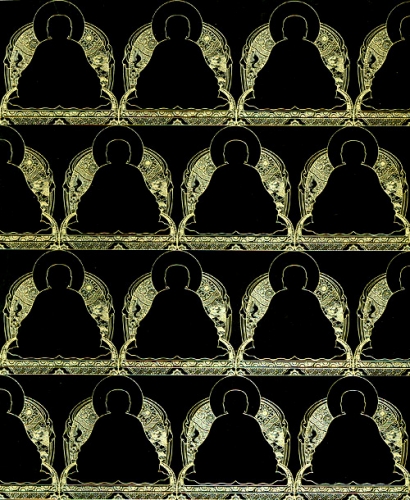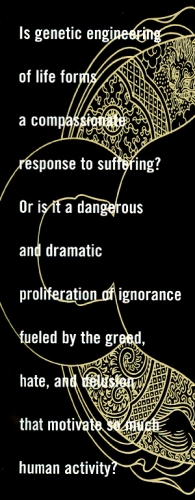 Humor aside, naive optimism has been the hallmark of the average American’s view of genetic research. As endless hype touts the latest advances in genetics, the imagined benefits appear irresistible: the elimination of disease and the unprecedented alleviation of suffering; an enriched and ever more abundant food supply; improved health and enhanced intellectual acuity; life spans verging on immortality. The wish list lengthens. What seemed a dream just a decade ago now seems to have become a reality. Genetic engineering, including transgenics (the process that transfers genes between organisms that would not naturally interbreed) and cloning, is fast becoming a fact of contemporary life, and one which many welcome with the same easy hope with which they greet most scientific advances.
Humor aside, naive optimism has been the hallmark of the average American’s view of genetic research. As endless hype touts the latest advances in genetics, the imagined benefits appear irresistible: the elimination of disease and the unprecedented alleviation of suffering; an enriched and ever more abundant food supply; improved health and enhanced intellectual acuity; life spans verging on immortality. The wish list lengthens. What seemed a dream just a decade ago now seems to have become a reality. Genetic engineering, including transgenics (the process that transfers genes between organisms that would not naturally interbreed) and cloning, is fast becoming a fact of contemporary life, and one which many welcome with the same easy hope with which they greet most scientific advances.
But it seems there’s something altogether new afoot: with its agricultural, medical, and reproductive applications, genetic engineering will leave no aspect of our world or our lives untouched. Transgenics is used to manipulate corn, wheat, rice, and other crops; manufacture biological and genetically targeted weapons; create fuel; develop medicine and medical procedures. When combined with cloning, it offers humans the ability to genetically modify the sentient world. Yet even as genetic engineering has begun to rewrite life and its evolutionary processes, the applications of this powerful and unpredictable technology have remained largely unexamined. And while Buddhist ethics in the West continues to focus on issues like abortion, sexual indiscretion, physical abuse, race, and gender, the young science of genetic manipulation progresses rapidly in both agriculture and medicine with little or any public notice from the same quarter.
What shape would a Buddhist perspective take? Is genetic engineering of life forms a compassionate response to suffering? Or is it a dangerous and dramatic proliferation of ignorance fueled by the greed, hate, and delusion that motivate so much human activity?
On the agricultural front, the “Gene Giants”—Monsanto, Novartis, DuPont, and other purveyors of genetically engineered seeds—advocate genetic engineering from the compassionate high ground. Genetic engineering is necessary, they assert, to feed the hungry, reduce the use of toxic pesticides, and deliver medicine and vaccines to the poor. But their actions belie their rhetoric. The economics of feeding the poor, for instance, has been insufficiently profitable for the Gene Giants to pursue it. The only crop designed to improve nutrition, so-called Golden Rice, was developed by scientists funded exclusively by foundations. To date, serious questions remain with regard to its efficacy.
In addition to genetically modified crops, transgenic goats, cows, mice, and pigs already exist. The U.S. Food and Drug Administration is preparing to approve for release a fast-growing, genetically modified salmon, and genetically modified carp may already be in commercial use in China; and scientists are preparing to release genetically engineered bugs into the wild—a male moth designed to pass a fatal flaw on to any egg it fertilizes. In an attempt to eradicate the bollworm moth, which decimates cotton, millions of these modified males will be scattered over crops, enough to crowd out wild males in the quest for mates in the hope of reducing the bollworm population. However, these insects will be impossible to recall, whatever the consequences.
While genetically engineered plants, bugs, and fish are likely to alter the processes and evolution of the natural environment, cloned and genetically engineered humans could forever change the course of human evolution. What once seemed like science fiction is imminent. In fact, two human cloning experiments are now under way, one by the “Raelians,” a spiritual sect hoping to clone the dead child of two of its members in a hidden laboratory; another by Dr. Panayiotis Zavos of the Andrology Institute of America and the Kentucky Center for Reproductive Medicine and In Vitro Fertilization. Dr. Zavos has launched a serious effort to clone humans for infertile couples; he expects a viable clone will be born within the year.
 People look to cloning for several reasons: to bring back a lost loved one; to confer upon themselves a kind of immortality; because they cannot have a child. Cloning raises a complex of fundamental Buddhist issues: Is not the desire to clone a lost loved one an example of the most painful Sort of clinging from which Buddhism seeks to release us? Does not the cloning of one’s self represent the ultimate in self-reification (notwithstanding that the cloned being is a distinctly different human from one’s self with a distinctly different mind)? Is cloning for reasons of infertility more justifiable or just another instance of our attachment to notions of self?
People look to cloning for several reasons: to bring back a lost loved one; to confer upon themselves a kind of immortality; because they cannot have a child. Cloning raises a complex of fundamental Buddhist issues: Is not the desire to clone a lost loved one an example of the most painful Sort of clinging from which Buddhism seeks to release us? Does not the cloning of one’s self represent the ultimate in self-reification (notwithstanding that the cloned being is a distinctly different human from one’s self with a distinctly different mind)? Is cloning for reasons of infertility more justifiable or just another instance of our attachment to notions of self?
For those capable of having children, genetic engineering may soon enable parents to “design” their children. Notwithstanding the uncertain viability—so far—of the technology, advocates of “designer babies” portray human genetic modification as an issue of reproductive choice and scientific progress. Opponents, on the other hand, worry about the social inequities of a society divided between the “GenRich,” who benefit from genetic manipulation, and the “Naturals,” who do not. Cell biologist Lee Silver looks forward to a future where the genetically endowed GenRich will constitute ten percent of the American population and will control all aspects of the media, the economy, and the knowledge industry, while the remaining ninety percent of the population, the Naturals, will be low-paid service providers and laborers. At some point, Silver believes, the two classes will become separate species unable to mate and with “as much romantic interest in each other as a current human would have for a chimpanzee.” Traditional Buddhist cosmology may require a new realm.
For the most part, decisions about the applications of genetic engineering are made quietly and behind closed corporate doors. Yet the economic gain for the few who “own” the life they are manipulating has potentially grave consequences for humans and other species. The Gene Giants disregard the impact of their actions on our global ecosystem when, in fact, no one has any idea how altering species and mixing genes in the environment will affect complex ecosystems or evolution. Regarding transgenic plants, Steve Jones, professor of genetics at University College in London, believes that genetic pollution is inevitable, that genes from genetically manipulated plants will mix with other plants with potentially :.devastating consequences. “Everybody knows that, and we have no idea what is going to happen.” Should the gene be one that confers resistance to insects, “suddenly we have no insects. With no insects you have no ecology, no ecosystem, no pollinators, no flowers, God knows what.” Where might a Buddhist investigation of these matters take us? A recent novel, The Elementary Particles by Michel Houellebecq, invokes Buddhism to vaguely support a post-human, cloned society. One of his characters suggests that
. . . mankind (had to) disappear and give way {through cloning} to a new species which was asexual and immortal, a species which had outgrown individuality, separation and evolution. It was superfluous to note the hostility with which such a project was greeted by the defenders of revealed religion. . . . Only Buddhists demurred, noting that all of the Buddha’s teachings were founded on the awareness of the three impediments of old age, sickness and death, and that the Enlightened One, if he had meditated on it, would not necessarily have rejected a technical solution.
I think that Houllebecq’s representation of a Buddhist analysis represents a “wrong view,” but a discussion of these issues in Buddhist circles would raise interesting questions and might take some surprising turns. Does a world where humans can (or think they can) begin to control their own evolution and that of the natural environment change our understanding of karma? Do we have the right to so radically alter the world for future generations? Would human cloning—reproduction obviating sex—eventually evolve us away from the craving conditioned by sexual desire? Would cloning reify notions of self, or would witnessing a proliferation of mini-me’s somehow serve to liberate us? Or are these advances motivated by the same ego-driven desire that gives rise to the age-old suffering that the Buddha labored to free us from?
The new and quickly escalating ability to manipulate life at the genetic level is as significant a development in human history as the capturing of fire and the splitting of the atom. Some sort of considered moral and ethical frame must guide the political and economic decisions to move forward with these new technologies. Investigation of these matters from a Buddhist perspective would both illuminate the Buddhist ethical discourse and deepen the broader and necessary public discussion.
Thank you for subscribing to Tricycle! As a nonprofit, we depend on readers like you to keep Buddhist teachings and practices widely available.